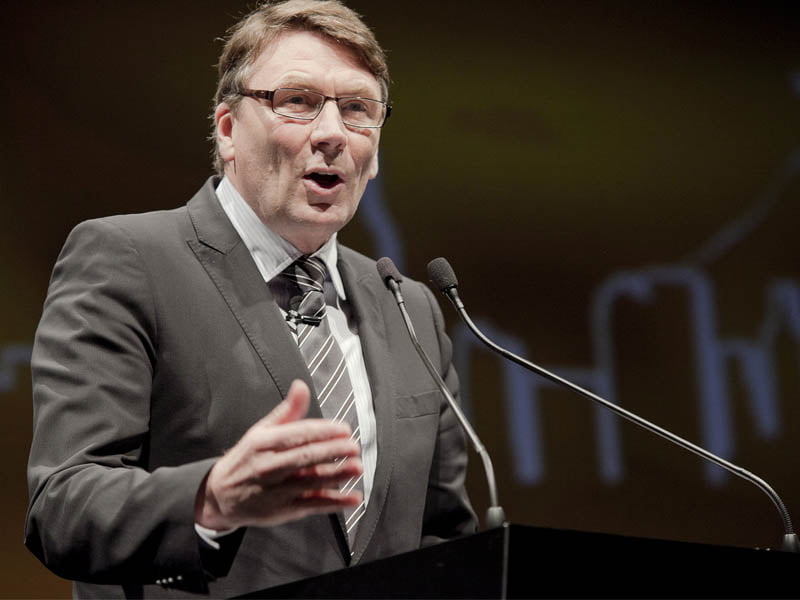CSIRO chairman and business leader David Thodey has called out Australia’s urgent need to better prepare for a volatile and uncertain future in a speech that also previewed the second iteration of the national research agency’s Australian National Outlook report.
The time for urgency to transform the economy away from the resource focus of the past two decades had arrived, he said.
Delivering the Manning Clark lecture at the Australian National University, Mr Thodey said there was plenty of opportunity and potential for Australia if it prepares for the difficult road ahead. But at present we are at great risk, because we are not investing appropriately to deliver a more diverse and innovative economy.

“Yes, we’ve had over 25 years of uninterrupted growth. But that growth has been largely built on resources exports and we lack economic complexity, which leaves us exposed to external shocks,” Mr Thodey said.
“Research done at Harvard’s Centre for International Development ranks Australia at 87th in the world for economic complexity, on par with Kazakhstan and Cuba,” he said.
“Yes, we do great research here in Australia. But our technology adoption rate is around 50 per cent lower than leading countries. And as percentage of GDP, we invest almost 40 times less in venture capital than the US and Israel.”
Mr Thodey sits in crucial leadership roles related to the future of the Australian economy. He is chairman of CSIRO, he is working on the Australian National Outlook II report to be published later this year, he chairs Jobs for NSW, and he chairs the Australian Public Service Review.
“I have a rather full hat-stand these days,” Mr Thodey says.
His Manning Clark lecture traversed across all of these roles and more as part of exploring a vision for the future of the economy, jobs, and the future of all work, and included an inter-generational view that extended to 2060.
“The rate and breadth of technological change over the last decade has been more than I have experienced in my 40 years in the industry. It is happening more quickly and more broadly than we have seen before,” Mr Thodey said.
“We’ve modeled a ‘do nothing’ scenario where no action is taken. We’re not yet at a point where we can share the results, [but] I can assure you that it doesn’t look pretty.”
“Our economic growth slows; inequality rises; our cities sprawl and become more congested; and we fail to meet our climate change commitments.”
Mr Thodey drew attention to series of responses, from diversification of the economy through technology and innovation, to improvements to education and training, greater investment in regional Australia, and improved agricultural productivity and water management.
On the APS Review, Mr Thodey said that Australia has one of the best public services in the world, and rather than ‘fix’ something that is broken his review is about preparation for the changing environment of the decades ahead.
“This review is of critical importance to all Australians – we all have an interest in ensuring our public sector is best placed to meet the inevitable challenges and opportunities of the coming decades,” said Mr Thodey.
Some of the themes he said are emerging from the review included greater operational flexibility for the APS, greater respect for the public service profession, greater focus on outcomes and cross-government collaboration, and the changing nature of leadership and expertise required within the APS.
Mr Thodey said there would be more news on the review later this month.
Touching on where his Jobs for NSW role meets CSIRO research, Mr Thodey said Data61 research had reconfirmed “that automation will impact somewhere between 30 per cent and 45 per cent of all tasks.”
“Interestingly, over 50 per cent of the new jobs in the SME market were from ‘Gazelles’ or scale-up companies with some digital element,” Mr Thodey said.
He believes the future would hold fewer corporate jobs and more self-employed, casual and part-time work, and that this required different social policy and educational skills.
In closing, Mr Thodey argued that it is science, technology and research that are core to the changes ahead. There was a need for a strong R&D capability “across the public and private sectors”, and that education and STEM skills would be “critical to our future prosperity.”
“Australia must continue to build a vision for a bright Australia as we manage some large transitions around the environment, trade, energy, economy, urbanisation and employment,” Mr Thodey said.
“We must continue planning for a very different workforce and workplace in the future.”
Do you know more? Contact James Riley via Email.

